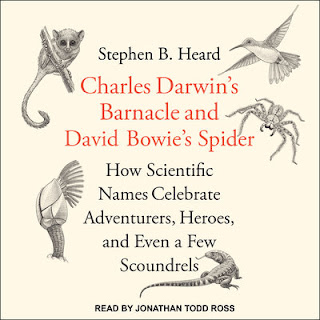When Carl Linnaeus invented the binomial naming system, he revolutionized taxonomy, and aside from the purely practical effects, he made possible eponymous naming--naming plants and animals after people. Stephen B. Heard gives us a very lively account of eponymous names, the people they commemorate, and the personalities involved. There are, as the subtitle says, "adventurers, heroes, and even a few scoundrels." It's very entertaining!
But in addition, tracing these names, the people who bestowed them and the people they commemorate, also reveals changes both in how the science of taxonomy is practiced, and in who is practicing it. This, too is lively interesting, and filled with colorful characters. There are also controversies such as whether scientists should ever name new species after themselves (social opinion in the world of taxonomy is no, and in fact it happens only rarely), and whether it's acceptable to name a species after someone to insult them. Again, opinion is strongly no--but with an added twist. It would be crass, but it's also pointless. Anyone who cares enough about the science to notice and care will consider it the honor it normally is, and if they don't care about science that much, they will barely notice.
There's also the practice of selling naming rights to new species, which seems like a temptation that could easily lead to corruption and commercialization, but hasn't.
There are many species named for the wives and daughters of the men who discovered them, but the species named after the husbands and sons of the women who discovered them has only started to happen relatively recently, because women were largely excluded from science. A related issue is the extreme rarity of species named for indigenous people of the areas were discovered, despite indigenous people having been critical members of the expeditions (largely led by white men of European origin or descent) that discovered them.
It's a fascinating book, and Jonathan Todd Ross does a great job of reading it in a clear and engaging way.
Recommended.
I bought this audiobook.

No comments:
Post a Comment